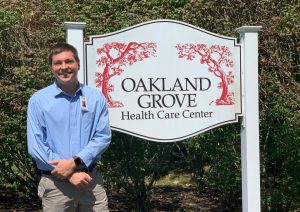Inside Athena: The ‘Ally’ Supporting Substance Use Disorders Patients At Oakland Grove
WOONSOCKET, R.I. — Ryan Papargiris says Oakland Grove Health Care Center is unlike the rest because the team at the Rhode Island facility understands what those managing substance use disorders are going through.
He’s worked at the center since November as a SUDS counselor, helping people manage the disease of addiction. It was the “innovative and cutting edge” facility that attracted him to join the team. Previously, he worked in a hospital doing prevention and recovery, connecting people with treatment options. Oakland Grove allows him to work with people for a longer period of time and build a relationship and rapport with them.

Ryan Papargiris at Oakland Grove Health Care Center
“It attracted me that this building acknowledged the need for this type of service as it’s one of those often stigmatized, people don’t want to talk about it, people don’t want to acknowledge the problem and brush it under the rug. I thought it was really great that they were acknowledging that this is happening in our world and also to do something about it,” he said.
In his role, he provides counseling and support for those with substance use disorders. For residents staying at the center for a shorter period of time, he meets with them to help during their stay but also works to prepare them for what’s next such as setting up counseling services for when they discharge back into the community.
Providing the services, support, and counseling they do make the stay for a person much better, Papargiris said. One reason for that is it can encourage them to stay longer.
“When people are in here, there’s not so many triggers. When they go back to their home, they may face one trigger after another after another and [we] kind of talk about that. Come up with a plan, ‘How are you going to face that? How are we going to get in front of that?’ and come up with a way to go through it beforehand so that way they’re prepared and have tools to address it when the time comes,” he said.
One of the biggest challenges he faces is making sure people leaving the center have a plan in place. He works to find housing, which can be an issue in the state due to the lack of availability. However, he said they get creative and find a solution. He called these “wins.”
“It forces us to think outside the box and come up with a new solution to meet the need of our folks,” he said. “I have high standards and expectations and I always want the best for the folks that I work with and, when it comes to fruition and I see that we’re giving them all the tools that they need to succeed and live a healthy life themselves and their families, it’s very rewarding.”
Another hurdle Papargiris has to overcome is the walls put up by the patients he works with. He explains how there’s a stigma that the disease of addiction is a choice and can be easily overcome. He notices that sometimes people are reluctant to bond with people like him because they may feel judged. That’s something he and the team work tirelessly to debunk.
He often begins his work with someone new by validating their experiences and making sure they know he is an ally in their journey. The addiction part may not even make it into the first few conversations.
“We try and instill hope and we try and show them that this can change, this can get better, and there is hope out there and we try and set them up with a pathway to move forward and embrace that hope,” he said.
Papargiris was drawn to this profession while working in the hospital. The psychiatric unit opened his eyes to the impact substance use disorders can have on people and their loved ones. It was also personal for him as he knew people from high school who had died from an overdose. He felt like he could help people overcome those challenges. Papargiris holds two bachelor’s degrees in psychology and biology and a master’s degree in neuroscience and behavior, all from UMass Amherst.
In addition to his mental capacity, he has a social personality suited to what he does. He said he’s always been able to connect and relate with people. It’s a goal of his and the team at Oakland Grove to make their residents and patients feel comfortable and welcome. Their stay isn’t just about their addiction. Papargiris explains how it’s important to check in on them to see how other things in their life are going and to never stigmatize them. He works to establish coping skills for the residents and develop a plan to tackle problems when they arise. He emphasizes that people have the strength to do whatever they set their minds to.
Follow Athena Health Care Systems on Twitter and Facebook & Oakland Grove Health Care Center on Facebook. Interested in a career with Athena? Click here!

